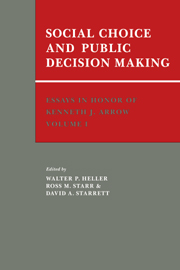PART II - DECISION MAKING IN THE PUBLIC SECTOR
Published online by Cambridge University Press: 05 November 2011
Summary
The study of “market failure” had a long history before Arrow. Most of this work involved identifying areas in which decentralized markets would not reach the first best (monopolies, public goods, externalities) and discussing appropriate modifications for those situations. For example, Lindahl shares could be used to allocate public goods, and Pigovian taxes could be used to correct for externality. Subsequently, Arrow was a significant contributor to this literature; he developed a general model that showed that virtually every type of nonmarket interaction could be corrected in principle through the use of appropriate “extended” markets. However, he pointed out very clearly the limitations of this approach, arguing that the information requirements and/or monopoly incentives inherent in extended markets would render them unworkable in many circumstances.
If we concede the impossibility of first-best pseudomarket procedures, then public sector planning must move in one of two directions. On the one hand, we can back away from “markets” and think about planning problems in an institution-free setting. Arrow contributed to this approach in a series of papers and a book (coauthored with M. Kurz) analyzing intertemporal consumption and public investment problems. Two chapters in this section deal with this approach. Scarf looks at planning problems in the presence of indivisibilities, which render market approaches unworkable. He discusses computational procedures that will “solve” a restricted class of such problems.
- Type
- Chapter
- Information
- Essays in Honor of Kenneth J. Arrow , pp. 115 - 116Publisher: Cambridge University PressPrint publication year: 1986



